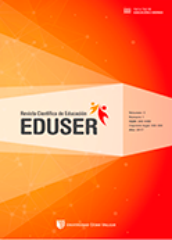Pre-reading skills in early childhood children
DOI:
https://doi.org/10.18050/eduser.v7i2.2691Keywords:
Capacity, Dexterity, Inference, Initial reading, Pre-reading skills, Psycholinguistic process, Cognitive processAbstract
Pre-reading skills are important because they allow developing from an early age the necessary foundations to achieve a clear and fluent understanding of information. This leads the child to infer, analyze and synthesize written texts in various playful situations that stimulate said ability, differentiating written or verbal knowledge, emerging writing and linguistic awareness are gradually being perfected, until the child reaches the skills necessary for the development of literacy. The research described the findings obtained from a comparative study of two educational institutions of the Initial level of the Constitutional Province of Callao and the San Martin de Porres district of Lima. The state of the art is based on the contributions of psycholinguistics and cognitive psychology on the learning of initial reading. A sample of 86 children was considered, the approach was quantitative, non-experimental design. The findings show that there is no significant difference regarding the level of pre-reading skills between both samples. The study's contribution points out the relationship between the development of reading and writing, since by interacting with its various elements, the capacity is developed so that it matures to achieve learning from the reading of written media.
Additional Files
Published
How to Cite
Issue
Section
License

This work is licensed under a Creative Commons Attribution-NonCommercial-NoDerivatives 4.0 International License.













